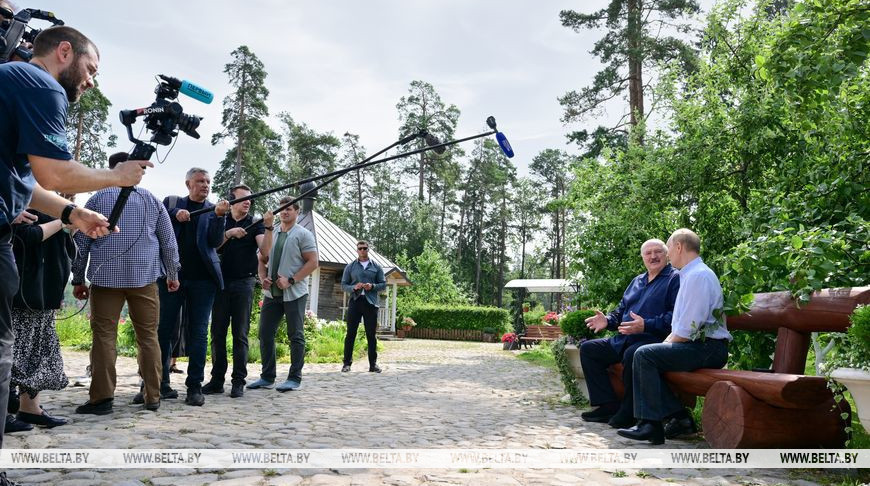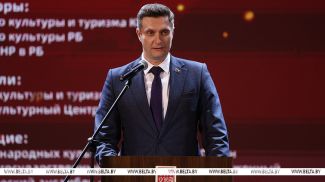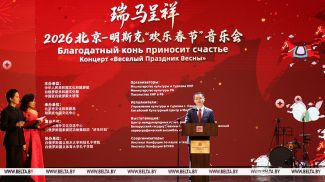
News of the story
"On Point"
MINSK, 6 August (BelTA) – Personal meetings between the leaders of Belarus and Russia demonstrate mutual respect and emphasize the importance of decisions that can only be made at the highest level, Elena Ponomareva, Doctor of Political Science, Professor at MGIMO (Moscow State Institute of International Relations), said in the latest episode of the V Teme [On Point] project on BelTA’s YouTube channel.
Commenting on the significance of the 1 August meeting between Belarusian President Aleksandr Lukashenko and Russian President Vladimir Putin on Valaam Island, Lake Ladoga, Elena Ponomareva highlighted several key points from the leaders’ statements. “These include the negotiation process [regarding Ukraine] and the identification of key obstacles to this process. Specifically, if Kiev believes it is not the right time for talks, Moscow can wait. Or, as Lukashenko echoed Putin’s opinion: if Trump wants peace in Ukraine, he should carefully engage in settlement efforts – dictating terms won’t work.”
Another crucial point, as the political scientist noted, was the response to journalists’ questions about Western sanctions and countermeasures. Elena Ponomareva expressed strong approval of the Belarusian leader’s approach to the issue. She referenced Aleksandr Lukashenko’s remarks prior to the Valaam visit, during a meeting with heads of Belarusian diplomatic missions, where he urged officials to disregard sanctions and other “Western fearmongering.”Belarusian president views Western sanctions as new incentives to diversify the country’s export markets. “I fully support this stance. In fact, serious sanctions against Russia have been in place since 2014, while Belarus has lived under restrictions even longer and, notably, has adapted more effectively,” the professor said. “The Soviet Union was once the only country capable of manufacturing aircraft of all classes and categories with a fully self-sufficient production cycle. Replicating that today may be unrealistic, but there’s clear understanding that we must develop our own industries in cooperation with our closest allies. In this context, it’s not even China that takes priority. Belarus comes first, especially as recent Union State programs have focused on integrating entire industrial sectors. For instance, aviation industry executives now report that up to 70% of some domestic aircraft components are locally produced.” Elena Ponomareva added that military security was also discussed during the meeting.
The political expert also emphasized that over the past 25 years, Aleksandr Lukashenko has made 140 visits to Russia. “Of these, 72 were bilateral high-level negotiations (governmental agreements, subordinate discussions, etc.), while 61 involved participation in major multilateral organizations – CIS and CSTO summits, EAEU meetings and sessions of the Union State’s Supreme State Council. This doesn’t even include official state visits, like the most recent one in March 2025. Such frequent and substantive engagements testify to the exceptional ties between our nations and the Belarusian leader’s principled approach: these matters are too critical to be resolved without direct personal involvement,” Elena Ponomareva concluded.
Commenting on the significance of the 1 August meeting between Belarusian President Aleksandr Lukashenko and Russian President Vladimir Putin on Valaam Island, Lake Ladoga, Elena Ponomareva highlighted several key points from the leaders’ statements. “These include the negotiation process [regarding Ukraine] and the identification of key obstacles to this process. Specifically, if Kiev believes it is not the right time for talks, Moscow can wait. Or, as Lukashenko echoed Putin’s opinion: if Trump wants peace in Ukraine, he should carefully engage in settlement efforts – dictating terms won’t work.”
Another crucial point, as the political scientist noted, was the response to journalists’ questions about Western sanctions and countermeasures. Elena Ponomareva expressed strong approval of the Belarusian leader’s approach to the issue. She referenced Aleksandr Lukashenko’s remarks prior to the Valaam visit, during a meeting with heads of Belarusian diplomatic missions, where he urged officials to disregard sanctions and other “Western fearmongering.”Belarusian president views Western sanctions as new incentives to diversify the country’s export markets. “I fully support this stance. In fact, serious sanctions against Russia have been in place since 2014, while Belarus has lived under restrictions even longer and, notably, has adapted more effectively,” the professor said. “The Soviet Union was once the only country capable of manufacturing aircraft of all classes and categories with a fully self-sufficient production cycle. Replicating that today may be unrealistic, but there’s clear understanding that we must develop our own industries in cooperation with our closest allies. In this context, it’s not even China that takes priority. Belarus comes first, especially as recent Union State programs have focused on integrating entire industrial sectors. For instance, aviation industry executives now report that up to 70% of some domestic aircraft components are locally produced.” Elena Ponomareva added that military security was also discussed during the meeting.
The political expert also emphasized that over the past 25 years, Aleksandr Lukashenko has made 140 visits to Russia. “Of these, 72 were bilateral high-level negotiations (governmental agreements, subordinate discussions, etc.), while 61 involved participation in major multilateral organizations – CIS and CSTO summits, EAEU meetings and sessions of the Union State’s Supreme State Council. This doesn’t even include official state visits, like the most recent one in March 2025. Such frequent and substantive engagements testify to the exceptional ties between our nations and the Belarusian leader’s principled approach: these matters are too critical to be resolved without direct personal involvement,” Elena Ponomareva concluded.













